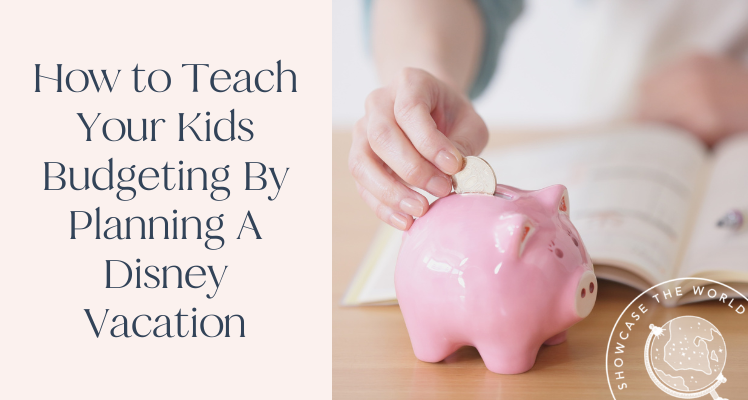How to Teach Your Kids Budgeting by Planning a Disney Vacation
Featured Post

Categories
Walt disney world
ACCOMMODATIONS
DINING
TOURING
other theme parks
DISNEY LAND
Universal orlando
Family cruising
Disney cruise line
River cruising
cultural experiences
ADVENTURES BY DISNEY
relaxing beach destinations
everything else
Math has never been my favorite subject, but I LOVE travel math! Somehow, it always comes out that it is cheaper to add an extra day to my Disney ticket, or to get the Dining Plan for some extra snacks. I never thought I would use math once I left school, but then I learned about budgets—now why didn’t they teach that skill in school?
I really wish I had learned to budget my money when I was young. The mechanics of budgeting aren’t that hard to pick up later, but what I really missed out on was the chance to build good money habits early on. And like most habits, those get harder to form as you get older, and then bad habits have the chance to take root.
You can try to involve your kids in your daily budget management, or try to help them start saving for college, but vacations are very real, very immediate things that they are interested in. You also have the added benefit of getting your whole family involved in the trip planning, which gives them a sense of responsibility and greatly cuts down on resistance and meltdowns while on your trip.

Spending Money
If you aren’t ready to take the plunge and have your kids fully invested in vacation decision making, start by giving them a gift card or a certain amount of cash to buy souvenirs. They have the freedom to decide what to do with it, making them much less likely to ask you to buy everything they see. If they blow it all on the first day, you can let them suffer a little bit, then have a conversation about other choices they could have made. They will still get to eat and enjoy all the fun activities you have planned, so resist the temptation to refill their pockets—they will learn a lot more if you don’t give in.
Get Involved in the Saving
No matter how big your vacation budget, I highly recommend getting your kids involved in saving to teach them valuable money management skills. Start the discussion with where you want to go and that you can’t get there until you have saved enough money. Create a telethon-style savings tracker and put it in a prominent place so that they can see how their efforts contribute.

Your kids’ ages definitely make a difference in how involved they can be, but most kids get really excited about saving. Here are some of my favorite ways:
Give yourself and the kids an allowance for cash expenditures (i.e. groceries, gas, meals out, entertainment, etc.) and make a game of seeing how much of your allowance you can NOT spend. Anything left over at the end of the week (or month) goes into the vacation fund.
Bank $5 bills. This is one of my favorite ways to save for vacation. I try to pay with cash wherever I can (because I am terrible about paying off my credit cards), and every time a $5 bill comes in, it goes into a separate envelope to be put into the vacation account.
Make it a game. Get everyone to turn out the lights when no one is in the room, and turn off TVs and computer equipment when they’re not in use. Keep a tally for who turned it off. These measures may only save you a buck or two a month on your utility bills, but it all adds up.
Let them contribute. Have your kids find ways to contribute to the fund while also teaching them money and business skills. If you have elementary school kids, spend an afternoon with a lemonade or baked good stand. Older kids can start a dogwalking, yard work or babysitting business. Teach them about budgeting by contributing some of their earnings to the college fund, some towards the family vacation, and the rest can be pocket money.

Make Important Decisions
As your kids get older, you can involve them in the actual planning. Let them see exactly how their hotel choice affects the spending money they have left.
To begin, set some cost and travel parameters, then have your kids go online to come up with some vacation ideas. Set a deadline for them to present their ideas to the whole family at a family meeting. They have to come up with ideas that will suit the whole family, within the budget. Then the whole family gets to vote on your next vacation!
One of the most popular lessons of my Walt Disney World inspired homeschool lessons ”Learn at Home with Disney Magic” series is the Magic of Math, which walks students through the basics of vacation budgeting with worksheets. The worksheets allow them to see how their decisions affect the overall vacation, compare resort amenities to find the best value and calculate dining expenses. You can purchase that lesson as well as the other 9 here.
Traveling with your children is already one of the best things you can do for them, developing essential traits they can’t get anywhere else. If you add money management skills into the incredible benefits they get from traveling your kids will be set for life.
Who is Christina?

Meet Christina Vieira, a Traveler, a Planner, and a Mom. She is also the owner of Showcase the World Travel, a modern travel agency that helps busy Moms take the vacation they deserve without adding “planning it all” to their to-do lists. After all, Mom should get to enjoy their vacation, too.
She specializes in Disney, the Caribbean, and Europe, and has helped dozens of families have magical vacations that they will always remember. She loves traveling with her four-year-old, Annabelle. Her favorite destinations include Walt Disney World, Wyoming, and Prague.

Showcase the World is a participant in the Amazon Services LLC associates program, an affiliate advertising program designed to provide a means for sites to earn advertising fees by advertising and linking to amazon.com. Showcase the World also participates in other affiliate programs and may earn a commission for purchases made through links on this site.